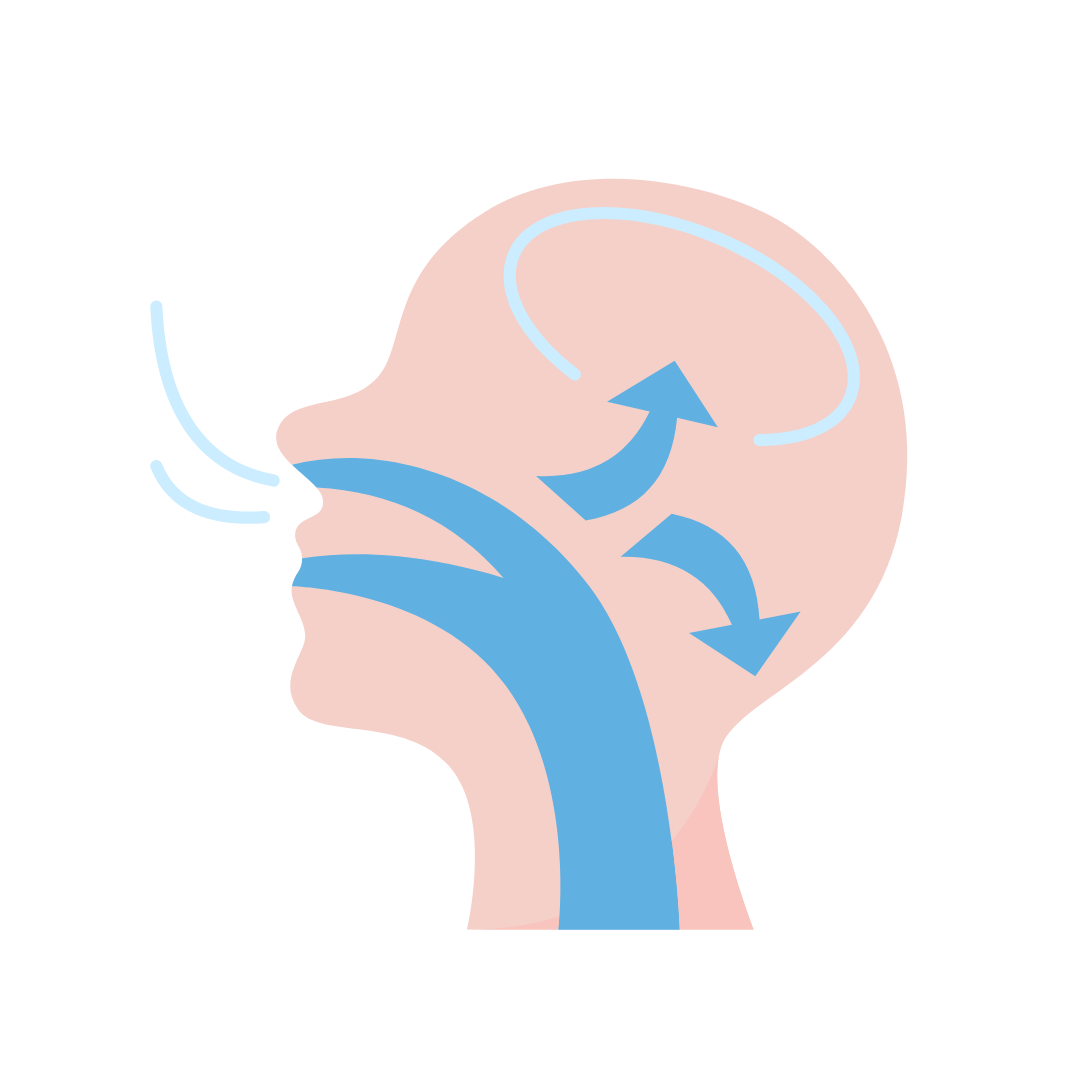Nasal breathing is essential for maintaining optimal respiratory function, supporting overall health, and preventing potential issues associated with mouth breathing.
It contributes to efficient oxygen exchange, provides filtration and humidification, and promotes a range of physiological benefits.

Why is Nasal Breathing Important?
- Filtration and Humidification: The nasal passages act as a natural filter, trapping particles, dust, and pathogens from the air before it reaches the lungs. Additionally, nasal breathing helps humidify the air, ensuring that it is moistened before entering the respiratory system. This helps prevent irritation and damage to the delicate lung tissues.
- Temperature Regulation: Nasal breathing helps regulate the temperature of the air entering the lungs. The nasal passages warm the air during inhalation, preventing the respiratory system from being exposed to cold and dry air, which can be irritating.
- Improved Lung Function: Breathing through the nose promotes diaphragmatic breathing, which engages the diaphragm and encourages deeper breaths. This type of breathing is more efficient for the respiratory system and enhances the distribution of oxygen throughout the body.
- Reduced Mouth Breathing Issues: Chronic mouth breathing can lead to various health problems, including dry mouth, bad breath, and an increased risk of dental issues. Nasal breathing, on the other hand, supports oral health and prevents some of the issues associated with mouth breathing.
- Promotion of Relaxation: Breathing through the nose has a calming effect on the nervous system. It activates the parasympathetic nervous system, leading to a sense of relaxation and reduced stress levels.
It’s important to note that occasional mouth breathing, such as during physical exertion or in certain situations, is normal. However, chronic or habitual mouth breathing, especially during sleep, may have negative consequences for overall health. If mouth breathing is persistent, it’s advisable to consult with a healthcare professional or an ear, nose, and throat (ENT) specialist to identify and address the underlying causes.

Why is Mouth Breathing Harmful?
- Dry Mouth: Breathing through the mouth can result in a dry mouth. Saliva plays a crucial role in maintaining oral health by neutralizing acids, washing away bacteria, and aiding in digestion. A dry mouth can contribute to bad breath, tooth decay, and gum problems.
- Dental Issues: Mouth breathing may lead to changes in facial and dental development, particularly in children. It can contribute to a condition known as “malocclusion,” where the teeth are misaligned. This misalignment can affect the way the jaws develop and may require orthodontic intervention.
- Decreased Oxygen Intake: Nasal breathing filters and humidifies the air, optimizing it for efficient oxygen exchange in the lungs. Mouth breathing bypasses these natural processes, potentially leading to reduced oxygen intake and affecting respiratory efficiency.
- Increased Risk of Infections: The nose acts as a natural filter, trapping particles and pathogens from the air before they reach the respiratory system. Breathing through the mouth increases the risk of inhaling airborne bacteria and viruses, potentially leading to respiratory infections.
- Sleep Disruptions: Chronic mouth breathing, especially during sleep, can contribute to sleep disruptions such as snoring and sleep apnea. It may result in poor sleep quality and daytime fatigue.
- Speech and Language Development: In children, prolonged mouth breathing can impact speech and language development. It may lead to the development of certain speech patterns and affect the positioning of the tongue during speech.
- Facial Development Issues: Mouth breathing can influence facial development, particularly in children whose facial bones are still growing. It may contribute to an elongated face, a narrow upper jaw, and changes in the alignment of the teeth.
- Temporomandibular Joint (TMJ) Issues: Mouth breathing can affect the position of the tongue and jaw, potentially contributing to TMJ issues and facial pain.
Why Might My Child Be Mouth Breathing?
- Nasal Congestion: Chronic nasal congestion due to allergies, sinusitis, or other respiratory conditions can force individuals to breathe through their mouths to get an adequate air supply.
- Enlarged Tonsils or Adenoids: In children, enlarged tonsils or adenoids can obstruct the airway, making it difficult to breathe through the nose. This often leads to habitual mouth breathing.
- Deviated Septum: A deviated septum, where the wall separating the nostrils is off-center, can impede nasal airflow and contribute to mouth breathing.
- Respiratory Infections: Conditions such as colds, flu, or respiratory infections can cause nasal congestion, making it temporarily necessary to breathe through the mouth.
- Chronic Sinusitis: Inflammation of the sinuses can lead to persistent nasal congestion, making it challenging to breathe through the nose.
- Allergies: Allergic reactions to pollen, dust, pet dander, or other allergens can cause nasal congestion and trigger mouth breathing.
- Habitual Mouth Breathing: Over time, some individuals develop a habit of breathing through the mouth, even if there is no underlying medical cause. This habit may persist and become chronic.
- Sleep-Related Breathing Disorders: Conditions such as sleep apnea, where breathing is repeatedly interrupted during sleep, can lead to mouth breathing as the individual attempts to maintain airflow.
- Nasal Polyps: Soft, noncancerous growths on the lining of the nasal passages, known as nasal polyps, can obstruct airflow and contribute to mouth breathing.
- Environmental Factors: Dry or dusty environments may prompt mouth breathing, especially if the air is not adequately humidified.
The specific cause of mouth breathing can vary from person to person. If someone is experiencing persistent or chronic mouth breathing, it is advisable to consult with a healthcare professional, such as an ear, nose, and throat (ENT) specialist, to determine the underlying cause and develop an appropriate treatment plan. Addressing the root cause is crucial for managing and preventing the negative consequences associated with chronic mouth breathing.

